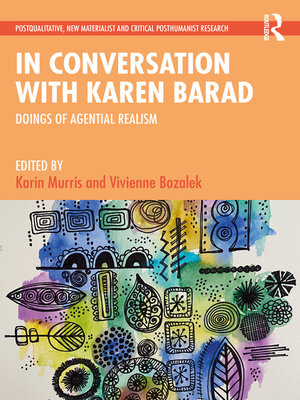In Conversation with Karen Barad
ebook ∣ Doings of Agential Realism · Postqualitative, New Materialist and Critical Posthumanist Research
By Karin Murris

Sign up to save your library
With an OverDrive account, you can save your favorite libraries for at-a-glance information about availability. Find out more about OverDrive accounts.
Find this title in Libby, the library reading app by OverDrive.



Search for a digital library with this title
Title found at these libraries:
| Library Name | Distance |
|---|---|
| Loading... |
In Conversation with Karen Barad: Doings of Agential Realism is an accessible introduction to Karen Barad's agential realist philosophy. The authors take on a unique approach to involve the readers in in/formal conversations between Karen, postgraduate and other researchers at a research event held in 2017 at Cape Town, South Africa.
It features chapters that have been contributed by seminar delegates and organisers, which put forth the continuing impact that Karen Barad has had on their empirical work, research writing and drawing practices. The text further discusses the ethical and political significance of Karen's work, especially in the context of de/colonizing South African higher education. The chapters offer a series of worked posthumanist pedagogical examples and describe how a research seminar was organised differently and more in line with Baradian radical philosophy. At its heart, this book makes a methodological and pedagogical contribution to the surge in literature on agential realism, whilst simultaneously challenging dominant research binaries and arguing for a more egalitarian way of working together in knowledge-creation by troubling human and more-than-human hierarchies. The book's uniqueness is further fortified through its description of in/formal conversations, which are diffracted through chapters, a doing of agential realism to reconfigure relationships between lecturer and student, expert and novice, supervisor and supervised, researcher and research participants. These radical conversations are dis/continuing.
This book will be invaluable for students and individuals interested in advancing their understanding of agential realism and Karen Barad's influence at large, as well as students and scholars interested in postqualitative methods in all disciplines.







